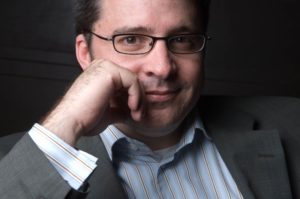Jefferson Davis’ statue coming down in Richmond, Va., and Walmart refusing to fly the Mississippi state flag because of its Confederate emblem are powerful signs the movement against white supremacy is taking hold, Robert P. Jones said during an online discussion hosted June 26 by the BJC.
“We are at a moment of reckoning,” said Jones, CEO and founder of the PRRI research group. “This is an opportunity for us to begin a truth-telling campaign” that will “set us on a path of reconciliation and a path of justice.”
Jones was the featured guest of BJC’s “A National Conversation on White Supremacy and American Christianity,” held at the National Press Club in Washington, D.C., and streamed to more than 1,000 viewers.
The online event was held in lieu of BJC’s annual luncheon at the Cooperative Baptist Fellowship’s General Assembly, which was virtual this year due to the COVID-19 pandemic.

Robert Jones (Photo/PRRI)
In response to a series of questions posed by Religion News Service’s Adelle Banks, Jones wove together his experiences growing up Southern Baptist in Mississippi with his educational background and research expertise to describe the insidious influence of racism in the white church and how Christians can meaningfully join the effort for racial justice.
A series of violent acts in recent years by white supremacists, some of them religiously motivated, has culminated in the current state of protest and unrest engulfing the nation, Jones said.
Those include the May killing of George Floyd by a Minneapolis police officer, the 2015 church massacre in Charleston, S.C., and the 2017 white supremacist rally in Charlottesville, Va.
“Charleston changed things. Charlottesville changed things, and I think George Floyd changed things,’ Jones said. “I think what we are seeing today is a releasing of this pent-up energy.”
But it’s been slow in coming as white churches — across the denominational spectrum — have been blind to their part in systemic racism or continue to ignore it, he added.
In researching his new book, White Too Long: The Legacy of White Supremacy in American Christianity, Jones said he saw the role Christianity was continuing to play in creating disparities between whites and Blacks.
It took him back to the 1970s in Jackson, Miss., when the first Black children began enrolling in his school — some 20 years after Brown v. Board of Education banned segregation in public schools.
Jones said his church was silent on matters of racial justice even while Ku Klux Klan members regularly passed out literature in public.
Jones, who earned a master of divinity degree from Southwestern Baptist Theological Seminary and a Ph.D. in religion from Emory University, said he was in his 20s before he read Martin Luther King’s “Letter from Birmingham Jail.” It was his first inkling that white Christianity is complicit in racism and opposing civil rights.
Sometimes white Christians can be so oblivious that they think “white supremacy” refers only to extremist groups, such as the KKK, he explained. “But if you flip it around to ‘supremacy of whites,’ you can see how society has been set up” to keep Blacks down through restrictive real estate practices, mass incarceration and other public policies.
Blacks also face higher COVID-19 infection rates because they are more likely to have at-risk jobs, he continued. “African Americans are three times as likely to know someone who has died of COVID.”
But white Christians tend to overlook the systemic nature of these facts and see them as unconnected — a trend borne out in recent research cited by Jones.
Polling has shown that white Christians from across the denominational and regional spectrum — not just Southern evangelicals — are likely to believe police killings of unarmed Black men are random events, and that the Confederate flag simply honors Southern heritage, he said.
Meanwhile, religiously unaffiliated whites are the most likely to share Blacks’ views on racism, Jones added.
The fact that the Southern Baptist Convention was founded to allow missionaries to own slaves illustrates how closely faith and racism have been intertwined, he said, and the results have been on display in the 21st century.
Dylann Roof, who killed nine African Americans during a Bible study at Emanuel AME Church in Charleston, S.C., viewed his actions as part of a faith-based “strategy of starting a race war,” Jones said.
Roof’s denomination, the Evangelical Lutheran Church in America, has since acknowledged racism in its history and has become more active “in racial spaces.”
Churches can no longer ignore the issue, Jones asserted. “I think silence is no longer going to be acceptable, because churches are losing numbers.” And those numbers are mostly among young people. “Young people will not tolerate silence on race.”
There are ways individuals and churches can push back against systemic racism and white supremacy, he suggested.
For example, individuals might journal on the topic to reflect on how it intersects their lives and churches. “Let the memories come,” he urged, then try to engage with African Americans who have been the victims of racism.
He noted that First Baptist Church, a predominantly Black congregation, and First Baptist Church of Christ in Macon, Ga., a white CBF congregation, have joined into a relationship. They began as one church — with blacks sitting in the back — but split before the Civil War.
“They are building community, and the white church is owning its history and telling the true story about racism,” Jones said.
Churches can no longer hide from the reality of white supremacy, Jones concluded. “We are at a moment of reckoning.”
